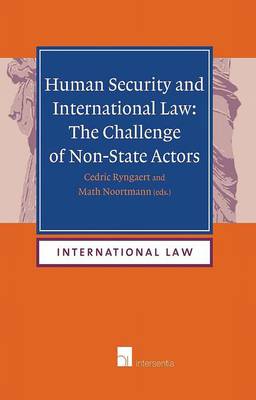
- Afhalen na 1 uur in een winkel met voorraad
- Gratis thuislevering in België vanaf € 30
- Ruim aanbod met 7 miljoen producten
- Afhalen na 1 uur in een winkel met voorraad
- Gratis thuislevering in België vanaf € 30
- Ruim aanbod met 7 miljoen producten
Zoeken
Human Security and International Law
The Challenge of Non-State Actors Volume 12
Cedric Ryngaert, Math Noortmann
€ 86,95
+ 173 punten
Omschrijving
In 1994, the United Nations Development Program (UNDP) coined the term 'human security' in the seminal UNDP Human Development Report. This report approached 'security' for the first time from a holistic perspective: security would no longer be viewed from a purely military perspective, but rather it would encapsulate economic, food, health, environmental, personal, community, and political security. Although the concept of human security accords a higher status to individual interests rather than to governmental interests, human security discourses have continually emphasized the central role of States as providers of human security. This volume challenges this paradigm and highlights the part played by non-State actors in threatening human security, as well as in rescuing or providing relief to those whose human security is endangered. The book does so from a legal perspective, (international) law being one of the instruments used to realize human security, as well as being a material source or guiding principle for the formation of human security-enhancing policies. In particular, the book critically discusses how various non-State actors - such as armed opposition groups, multinational corporations, private military/security companies, non-governmental organizations, and national human rights institutions - participate in the construction of such policies and how they are held legally accountable for their adverse impact on human security. (Series: International Law - Vol. 12)
Specificaties
Betrokkenen
- Auteur(s):
- Uitgeverij:
Inhoud
- Aantal bladzijden:
- 204
- Taal:
- Engels
- Reeks:
- Reeksnummer:
- nr. 12
Eigenschappen
- Productcode (EAN):
- 9781780682006
- Verschijningsdatum:
- 20/12/2013
- Uitvoering:
- Hardcover
- Formaat:
- Genaaid
- Afmetingen:
- 165 mm x 246 mm
- Gewicht:
- 521 g

Alleen bij Standaard Boekhandel
+ 173 punten op je klantenkaart van Standaard Boekhandel
Beoordelingen
We publiceren alleen reviews die voldoen aan de voorwaarden voor reviews. Bekijk onze voorwaarden voor reviews.











